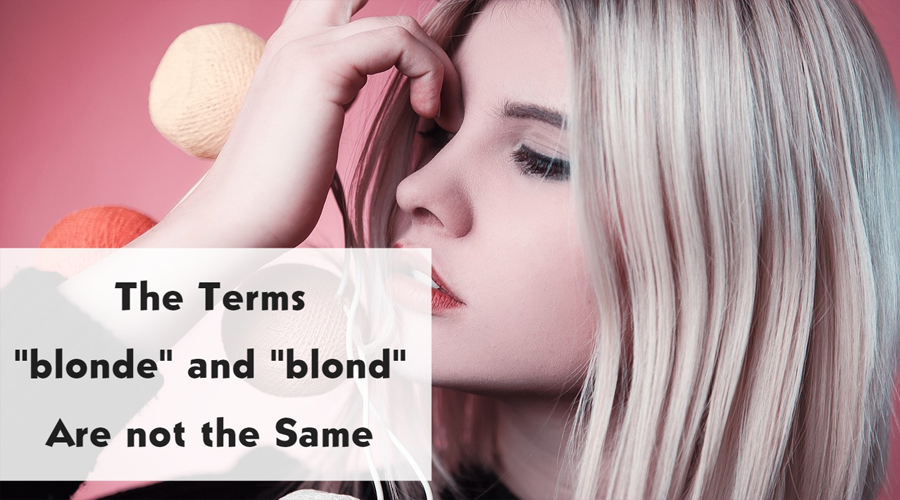Both the spelling and the meaning of the terms “blond” and “blonde” are distinct from one another. When referring to a man with yellowish hair or anything else that is masculine and has that color, the word “blond” is used as a noun.
While “blonde,” spelled with an “e,” is similar to “blond,” a noun that designates someone with light yellow hair or an adjective that denotes something with a yellow color, it differs in that it is spelled differently.
However, the word “blonde” conjures up images of women. In Northern Europe, the terms “blond” and “blonde” are frequently used to characterize residents.
Today, we will see the post of The Terms “blonde” and “blond” Are not the Same.
Let’s see together…
Table of content:
What does “Blond” Mean?
The term “blond” refers to a man or a male subject with hair that is light or pale yellow in color. The Old French words “blond” and “Blond,” which denote a hue between golden and light chestnut, were the source of the English word “blond.” The word “blond” was first used in the English language in 1481.
Then, from the French language, it was brought back in the 17th century. The definition of “blond” in the Oxford English Dictionary is “fair or pale yellow.” The English word “blond” is frequently used to refer to the fair, yellowish hair color.
In everyday life, it’s crucial to understand what “blond” means, especially if it’s an adjective. Because the meaning of a sentence immediately changes when letters are added to or removed from a word, it is important to carefully consider the words that are used in sentences.
When should you use the adjective “blond” in a sentence?
The term “blond” is used to define nouns for men and refers to the male subject’s yellowish hair color. The words “fair,” “light,” “light-colored,” “light-toned,” “yellow,” “flaxen,” etc. are synonyms for “blond.” When discussing a shade of yellow, such as a head of hair or the color of an object, the adjective “blond” must be used in the phrase.
We saw a blond guy pass this region previously, but we don’t remember his face, like in the sentence, “We saw a blond guy pass this area earlier.” Since the topic must be appropriately identified by its most distinguishing feature, “blond” was used in the sentence.
Is the difference between blonde and blond still standardized?
Despite style manuals, there may be a blurring of the lines between blonde and blond in contemporary writing. Marne Morris, a female country artist, was praised for her new “blond” hair in a Pop Sugar story from March 2019. In the meantime, a Time headline in January 2019 mentioned Chris Messina, a male actor, having “blonde” hair on the red carpet.
It’s not just hair, either. Some brewers offer blonde ales, while Starbucks sells blonde, not blond, espresso. Do they intend to make their beer or coffee more feminine, or are it just that we use the terms blonde and blond more frequently these days?
In his 2019 style manual, Dreyer’s English, Random House copy head Benjamin Dreyer warns: “‘Blonde’ bears some hefty cultural baggage through the moldy epithet ‘stupid blonde,’ so use it cautiously and carefully, if at all possible.
Why are “Blond” and “Blonde” used incorrectly and synonymously in English?
In English, the terms “blond” and “blonde” are frequently used incorrectly and interchangeably. The pronunciation is the cause of that. The way “blond” and “blonde” are spelled and used in sentences is another distinction between them.
In American English, the term “blond” is used to describe a guy or male with golden-colored hair. In British English, the term “blonde” is more frequently used to denote a female or woman with golden-coloured hair. The words “blond” and “blonde” have typically been used in British English or American English types of discourse, which causes erroneous use of these words, particularly for non-native speakers. There is no difference between how the words “blond” and “blonde” are used in terms of pronunciation or typing.
Blonde vs. blond, what’s the deal?
To allay your worries, neither is necessarily incorrect. Both “blonde” and “blond” are acceptable; however, depending on the situation, one is preferable to the other. To put it plainly, “blond” is an adjective applied to male nouns, while “blonde” is solely applied to feminine nouns.
Although many marketing campaigns employ the more feminine “blonde” form, the most popular “blond” spelling can technically be used for both masculine and feminine nouns.
Examples of the word “blond” in sentences:
Here are some examples of how to use blonde in sentences:
Examples of Blonde – using Blonde in a Sentence:
Some suitable usages of blonde in sentences are as follows:

